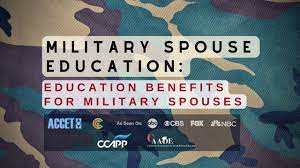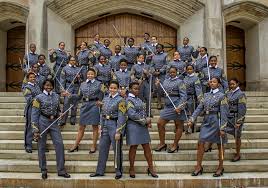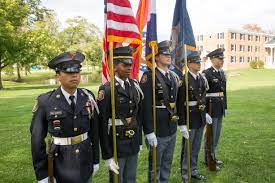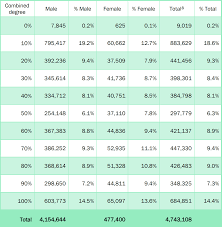Military Spouse Tuition Assistance: Supporting the Education of Military Families
Military spouses play a vital role in supporting their partners who serve in the armed forces. They face unique challenges, including frequent relocations and the need to adapt to new environments. One crucial aspect that can often be overlooked is their pursuit of education and career advancement. However, thanks to military spouse tuition assistance programs, these dedicated individuals now have more opportunities to further their education and achieve their goals.
Military spouse tuition assistance programs are designed to provide financial support for spouses pursuing higher education or vocational training. These programs recognize the sacrifices military spouses make and aim to alleviate some of the financial burden associated with obtaining a degree or certification.
One notable program is the My Career Advancement Account (MyCAA) Scholarship. This initiative, offered by the Department of Defense, provides up to $4,000 in financial assistance for eligible military spouses pursuing certifications, licenses, or associate degrees in high-demand fields. The MyCAA Scholarship covers expenses such as tuition fees, books, and necessary supplies.
The benefits of military spouse tuition assistance extend beyond financial aid. These programs also offer guidance and resources to help spouses navigate the educational journey successfully. They provide career counseling services, academic support, and access to online tools and resources that facilitate educational planning.
Moreover, military spouse tuition assistance programs are flexible and adaptable to accommodate the unique circumstances faced by military families. Since frequent relocations are common within this community, these programs often allow for portable benefits that can be utilized across different states or even overseas duty stations.
By supporting military spouses’ educational pursuits, these initiatives contribute not only to personal growth but also to increased employability. Many military families rely on dual incomes for financial stability, and an educated workforce enhances their economic resilience.
Furthermore, investing in military spouse education has broader societal benefits. By empowering these individuals through higher education or vocational training, we tap into a pool of talent that can contribute significantly to the workforce. Military spouses bring diverse skills, experiences, and perspectives that enrich various industries across the country.
It is essential to continue advocating for and expanding military spouse tuition assistance programs. By doing so, we acknowledge the sacrifices made by military families and demonstrate our commitment to their well-being. Additionally, supporting their educational aspirations strengthens our armed forces by ensuring a more resilient and capable military community.
In conclusion, military spouse tuition assistance programs are invaluable resources that empower and support the educational pursuits of military spouses. These initiatives provide financial aid, guidance, and flexibility to help spouses overcome the challenges associated with pursuing higher education or vocational training. By investing in the education of military spouses, we not only enhance their personal growth but also contribute to their employability and overall well-being. Let us continue to prioritize these programs as a means of honoring the sacrifices made by military families and strengthening our nation as a whole.
Frequently Asked Questions about Military Spouse Tuition Assistance
- Does a military spouse get free college?
- Do military spouses have to pay out of state tuition?
- Do military dependents get tuition assistance?
- Can spouses use military tuition assistance?
Does a military spouse get free college?
While military spouses may have access to various tuition assistance programs, it is important to note that they do not typically receive free college education. However, there are specific programs and scholarships available to help alleviate the financial burden associated with pursuing higher education or vocational training.
One notable program is the My Career Advancement Account (MyCAA) Scholarship, which provides up to $4,000 in financial assistance for eligible military spouses. This scholarship covers expenses such as tuition fees, books, and necessary supplies. It is specifically designed to support spouses pursuing certifications, licenses, or associate degrees in high-demand fields.
Additionally, military spouses may also be eligible for other forms of financial aid, such as federal grants or scholarships offered by educational institutions. These opportunities can further help reduce the cost of education for military spouses.
It’s important for military spouses to explore all available resources and programs that can assist them in funding their education. They should consult with their installation’s education center or seek guidance from organizations that specialize in supporting military families’ educational pursuits.
While free college education is not guaranteed for military spouses, there are numerous avenues of support available to help them pursue their educational goals and advance their careers.
Do military spouses have to pay out of state tuition?
Military spouses may be eligible for certain benefits that can help alleviate the burden of paying out-of-state tuition. The specifics of these benefits can vary depending on the state and the individual circumstances of the military spouse.
Under the Servicemembers Civil Relief Act (SCRA), military spouses may be eligible for in-state tuition rates if they have moved to a new state due to their spouse’s military orders. This provision helps prevent military families from being charged higher out-of-state tuition fees solely based on their relocation due to military service.
Additionally, some states have specific legislation or policies in place that grant military spouses in-state tuition rates regardless of their length of residency. These policies recognize the sacrifices made by military families and aim to support their educational pursuits by reducing financial barriers.
It is important for military spouses to research and understand the specific requirements and benefits available in their state of residence. Each state may have its own criteria and documentation requirements that need to be met to qualify for in-state tuition rates.
Furthermore, there are also federal programs available, such as the MyCAA Scholarship mentioned earlier, which can provide financial assistance specifically for education and training programs. While these programs do not directly address out-of-state tuition concerns, they can still help alleviate some of the financial burden associated with pursuing higher education.
In summary, while military spouses may still encounter challenges related to out-of-state tuition fees, there are various resources available at both state and federal levels that aim to mitigate these costs. It is crucial for military spouses to explore and take advantage of these benefits to ensure they receive fair treatment when pursuing higher education.
Do military dependents get tuition assistance?
Yes, military dependents can also receive tuition assistance through various programs. One of the most well-known programs is the Post-9/11 GI Bill, which provides education benefits to eligible service members and their dependents. Under this program, eligible dependents may receive financial assistance for higher education expenses, including tuition, fees, and housing allowances.
Additionally, each branch of the military offers its own tuition assistance programs for dependents. For example, the Army’s Spouse Education Assistance Program (SEAP) provides financial aid to spouses of active duty Army soldiers to pursue educational goals. The Navy and Marine Corps also have similar programs in place.
Moreover, some states offer specific tuition assistance or scholarship programs for military dependents. These programs vary by state but are designed to support the educational pursuits of military families residing within those states.
It’s important to note that eligibility criteria and benefits may vary depending on the specific program and individual circumstances. It is recommended that military dependents explore the available resources and consult with their respective branch’s education office or Veterans Affairs office for detailed information on eligibility requirements and how to apply for tuition assistance.
Can spouses use military tuition assistance?
No, military tuition assistance programs are generally not available to spouses. Military tuition assistance is a benefit provided to active duty service members to support their own educational pursuits. However, there are separate programs specifically designed to assist military spouses with their education expenses.
One such program is the My Career Advancement Account (MyCAA) Scholarship, which offers financial assistance to eligible military spouses pursuing certifications, licenses, or associate degrees in high-demand fields. The MyCAA Scholarship is administered by the Department of Defense and provides up to $4,000 in financial aid.
Additionally, there may be other scholarships or grants available specifically for military spouses through various organizations and institutions. These programs aim to support the education and career advancement of military spouses who often face unique challenges due to frequent relocations and other circumstances related to military life.
It’s important for military spouses to explore the specific educational benefits and resources available to them through programs like MyCAA or other scholarship opportunities tailored for their needs.




